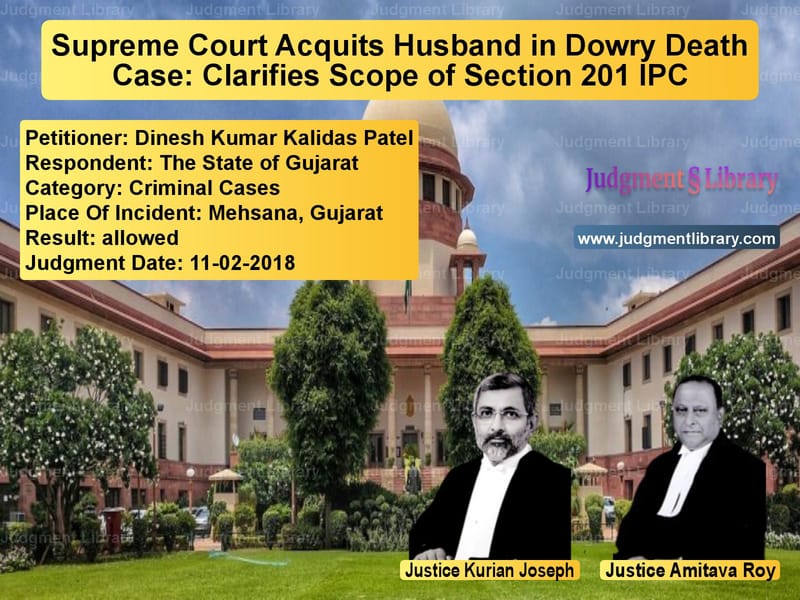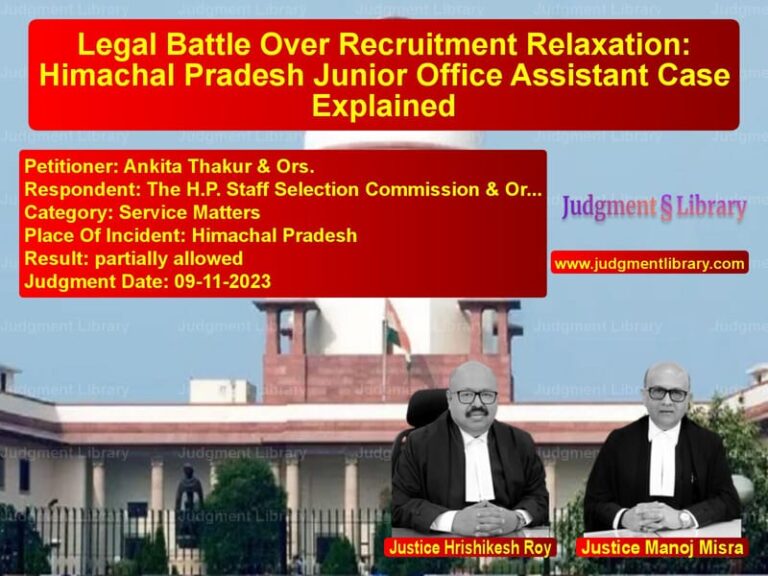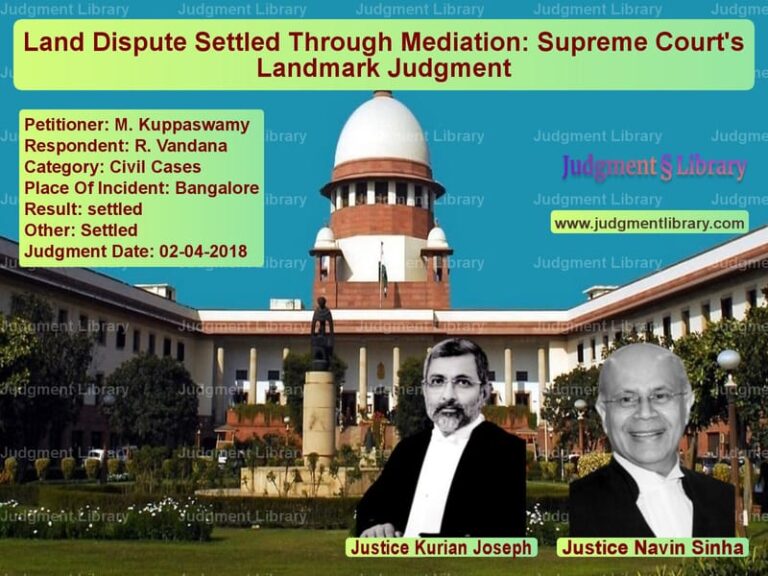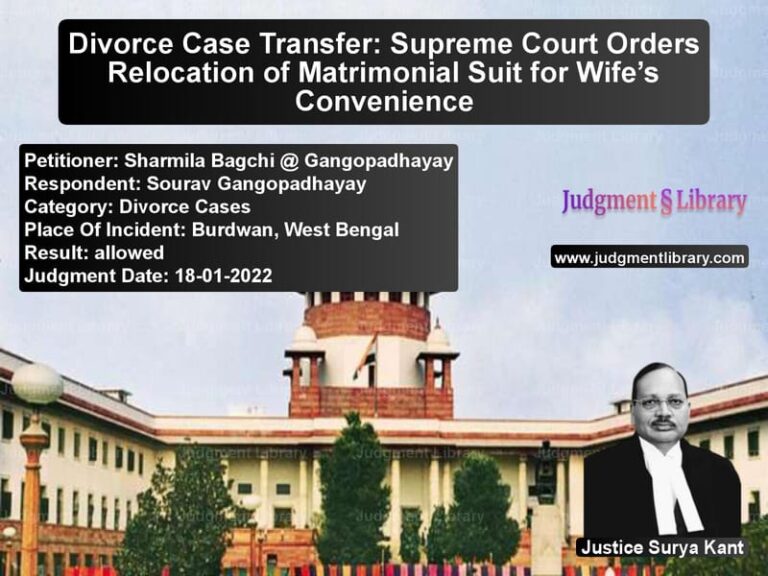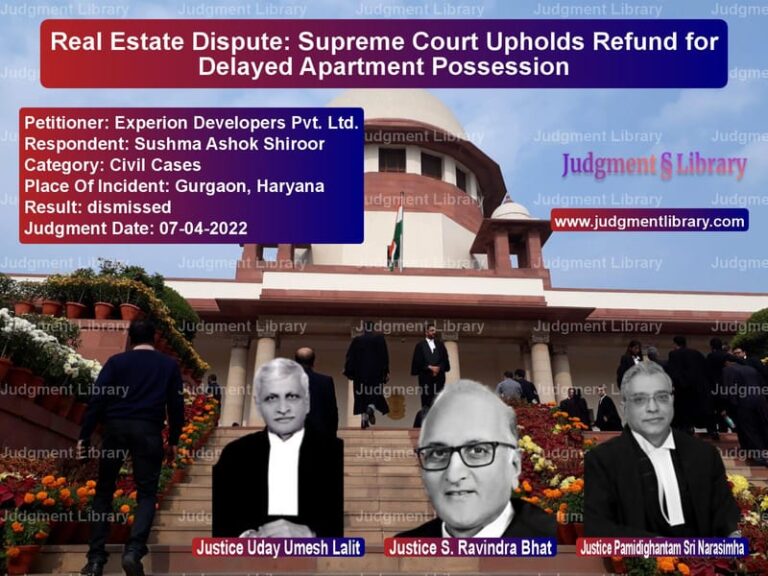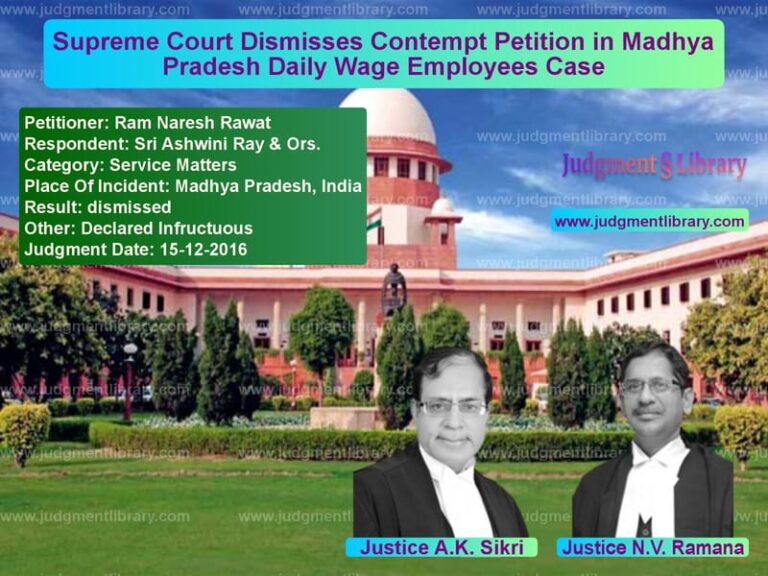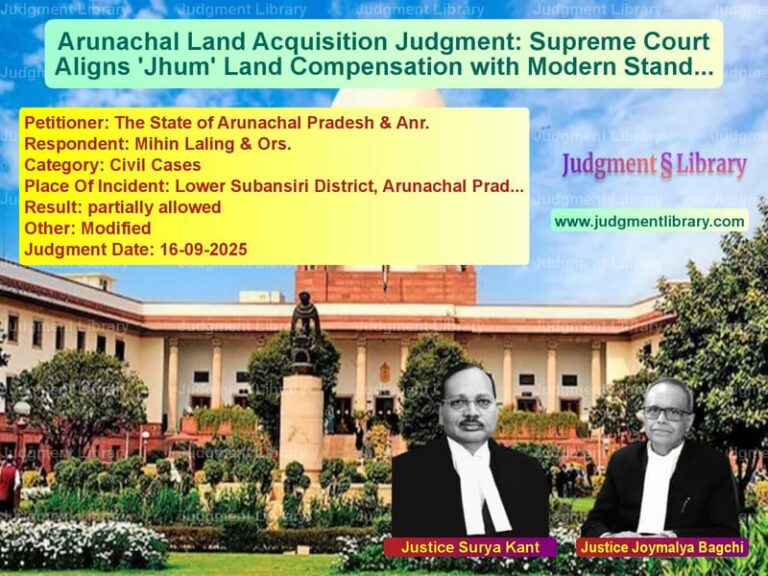Supreme Court Acquits Husband in Dowry Death Case: Clarifies Scope of Section 201 IPC
The Supreme Court of India, in its judgment dated February 12, 2018, ruled on a crucial case concerning dowry harassment and destruction of evidence under Sections 498A and 201 of the Indian Penal Code (IPC). The case, Dinesh Kumar Kalidas Patel vs. The State of Gujarat, involved the alleged abetment of suicide by the appellant’s wife and his failure to report her unnatural death.
In a significant ruling, the Supreme Court acquitted the appellant of the charge under Section 201 IPC, clarifying that a conviction under this section requires clear proof of intent to destroy evidence, not just an omission to inform the police about an unnatural death.
Background of the Case
The case dates back to December 26, 1990, when the appellant’s wife allegedly committed suicide by hanging. The information was conveyed to her family, and her father and brother, who was a doctor, attended the last rites. No complaint was made at the time.
However, on April 1, 1991—more than three months later—the deceased’s father filed a complaint, leading to an investigation and the subsequent prosecution of the appellant under:
- Section 304B (dowry death) IPC
- Section 306 (abetment of suicide) IPC
- Section 498A (cruelty by husband) IPC
- Section 201 (destruction of evidence) IPC
- Section 120B (criminal conspiracy) IPC
- Section 4 of the Dowry Prohibition Act, 1961
While seven co-accused were acquitted, the Sessions Court convicted the appellant under Sections 498A and 201 IPC.
High Court Ruling
In 2015, the Gujarat High Court overturned the conviction under Section 498A but maintained the conviction under Section 201 IPC. The reasoning was that the appellant failed to inform the police of his wife’s unnatural death and did not arrange for a post-mortem examination.
Key Legal Issues Before the Supreme Court
- Can a person be convicted under Section 201 IPC if they are acquitted of the main offence (dowry death or abetment of suicide)?
- Does failure to report an unnatural death automatically amount to destruction of evidence?
- What is the standard of proof required for conviction under Section 201 IPC?
Petitioner’s Arguments (Dinesh Kumar Kalidas Patel)
The appellant argued:
“A conviction under Section 201 IPC cannot stand if the prosecution fails to prove the commission of the main offence.”
He further contended:
- The deceased’s father and brother attended the last rites and raised no suspicion at the time.
- There was no evidence of dowry harassment or abetment to suicide.
- The deceased’s suicide note did not implicate him but indicated personal distress.
- There was no proof that he had actively destroyed evidence.
Respondent’s Arguments (State of Gujarat)
The prosecution argued:
“The failure to inform the police and conduct a post-mortem amounts to an attempt to screen the crime.”
Their primary claims were:
- The appellant did not report the unnatural death to the authorities.
- By immediately performing the last rites, he concealed crucial forensic evidence.
- The Sessions Court had correctly convicted him under Section 201 IPC.
Supreme Court’s Judgment
The Supreme Court ruled in favor of the appellant, stating:
“Conviction under Section 201 IPC requires proof that an offence was committed, that the accused knew about it, and that they actively took steps to conceal it. Mere failure to report an unnatural death is not sufficient.”
The Court cited precedents, including:
- Palvinder Kaur v. State of Punjab (1952) – Held that suspicion alone is not enough to convict under Section 201 IPC.
- Suleman Rehiman Mulani v. State of Maharashtra (1968) – Clarified that conviction under Section 201 IPC depends on establishing the commission of a primary offence.
- Ram Saran Mahto v. State of Bihar (1999) – Affirmed that mere omission to report an unnatural death does not attract Section 201 IPC.
The Court observed that neither the Sessions Court nor the High Court had proved that the appellant actively destroyed evidence. The presence of the deceased’s family at the last rites also undermined the claim of concealment.
Implications of the Judgment
- Sets a Precedent for Dowry Death Cases: Clarifies that mere omission to report an unnatural death does not constitute destruction of evidence.
- Ensures Fair Application of Section 201 IPC: Courts must establish intentional destruction of evidence, not just non-reporting.
- Strengthens Due Process: The ruling emphasizes that convictions must be based on concrete evidence, not assumptions.
Conclusion
The Supreme Court’s decision in Dinesh Kumar Kalidas Patel vs. The State of Gujarat reinforces the importance of due process in dowry-related cases. By setting aside the conviction under Section 201 IPC, the Court ensures that individuals are not wrongfully punished for mere omissions. This judgment will serve as an important reference for future cases involving unnatural deaths and alleged destruction of evidence.
Petitioner Name: Dinesh Kumar Kalidas PatelRespondent Name: The State of GujaratJudgment By: Justice Kurian Joseph, Justice Amitava RoyJudgment Date: 11-02-2018
Don’t miss out on the full details! Download the complete judgment in PDF format below and gain valuable insights instantly!
Download Judgment: Dinesh Kumar Kalidas vs The State of Gujarat Supreme Court of India Judgment Dated 11-02-2018.pdf
Direct Downlaod Judgment: Direct downlaod this Judgment
See all petitions in Dowry Cases
See all petitions in Suicide Cases
See all petitions in Legal Malpractice
See all petitions in Judgment by Kurian Joseph
See all petitions in Judgment by Amitava Roy
See all petitions in allowed
See all petitions in supreme court of India judgments February 2018
See all petitions in 2018 judgments
See all posts in Criminal Cases Category
See all allowed petitions in Criminal Cases Category
See all Dismissed petitions in Criminal Cases Category
See all partially allowed petitions in Criminal Cases Category

